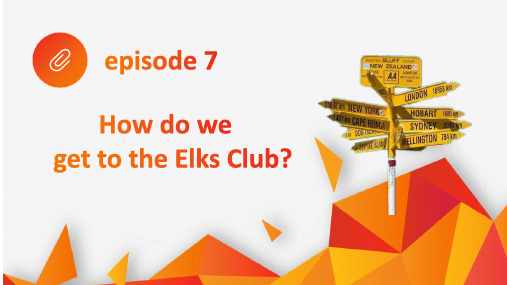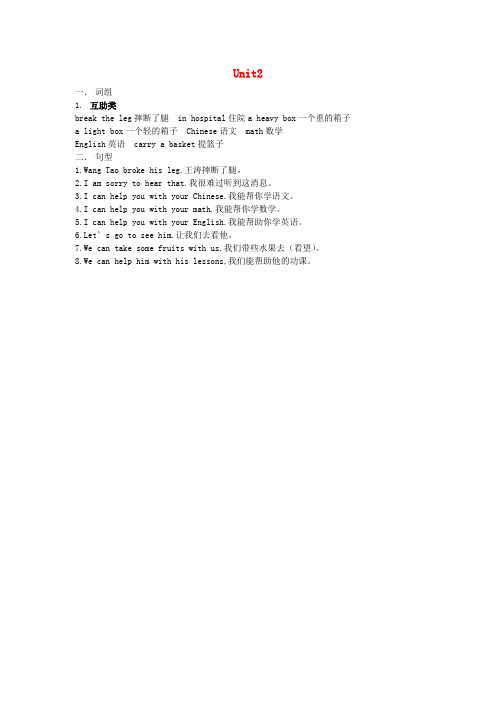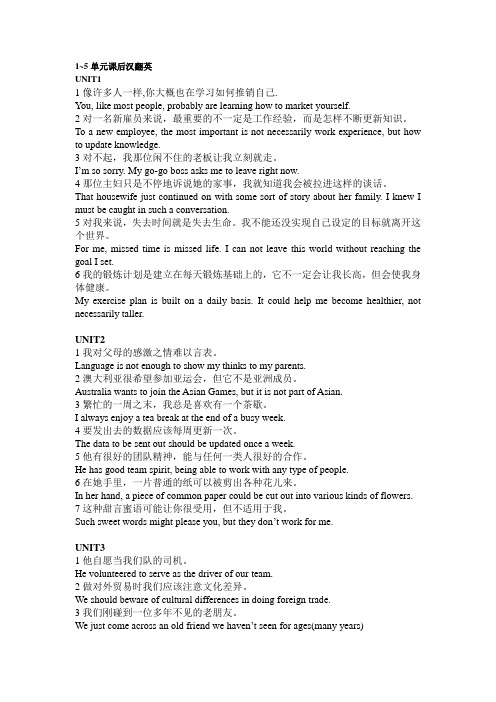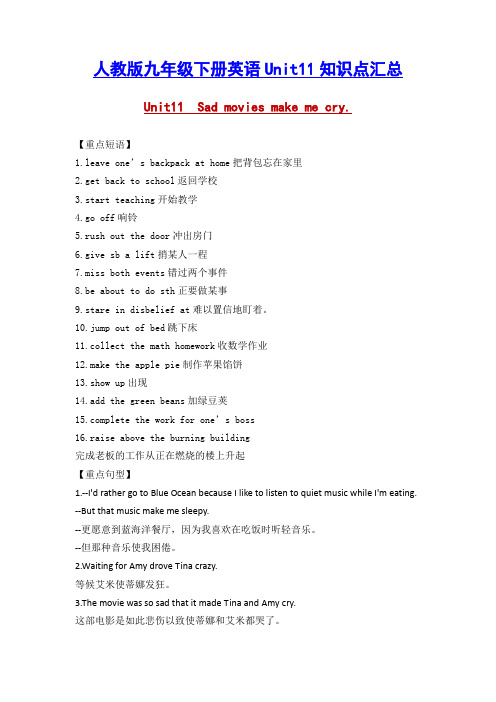新编实用英语基础教程Unit 11 Let's Help Each Other
新编实用英语第三版综合教程-Unit-1-Hello--HiPPT课件

Li Tiegang: Yes, I am.
Jack: How do you do, Mr. Li? I'm Jack Green from Zhonghua Technical
School.
Li Tiegang: Nice to meet you, Mr. Green. Welcome to our company.
Lu Yang: Hello, nice to meet you. My name is Lu Yang.
Michael: How do you do, Professor Lu? I'm Michael Breen. Please call me Mike.
Lu Yang: Welcome to our department, Mike.
Following Sample Dialogues Imitate and Perform
Putting Language to Use
-
Speak and Complete Speak and Communicate
4 Unit | One
SECTION I Talking Face to Face
-
8
Unit | One
Back
-
9
Unit | One
Following Sample Dialogues
Imitate and Perform
4 Read the following sample dialogues and try to perform your own tasks.
1) Meeting People for the First Time
Imitating Mini-Talks
新编实用英语(第四版)视听说基础教程How do we get to the Elks Club

2. A: __W__h_e_r_e_is___the new Italian restaurant? B: It’s__o_n_t_h_e__co__rn_e_r_of Kent Street and Oxford Street. A: Are you sure? B: Yes, it’s_n_e_x_t_to the post office.
2. Where is the Elks Club? a. On Maple Street. b. On Third Avenue. c. Next to the post office.
3. What does the woman want from Tracy? a. Her autograph. b. Her photograph. c. Directions.
Student A: Where’s … Student B: It’s on / on the corner of … Student A: How do I get there? Student B: Walk / Go / Turn … It’s next to /
across the street from …
Road. Go straight for two blocks and it’s next to the movie theater.
4 SUM-UP
Words and expressions
autograph n. 亲笔签名 block n. 街区;大厦
corner n. 角落 Italian a. 意大利的
交口县某小学六年级英语下册Unit2HelpingEachOther知识点汇总闽教版三起

Unit2一.词组1.互助类break the leg摔断了腿 in hospital住院a heavy box一个重的箱子a light box一个轻的箱子 Chinese语文 math数学English英语 carry a basket提篮子二.句型1.Wang Tao broke his leg.王涛摔断了腿。
2.I am sorry to hear that.我很难过听到这消息。
3.I can help you with your Chinese.我能帮你学语文。
4.I can help you with your math.我能帮你学数学。
5.I can help you with your English.我能帮助你学英语。
6.Let’s go to see him.让我们去看他。
7.We can take some fruits with us.我们带些水果去(看望)。
8.We can help him with his lessons,我们能帮助他的功课。
Unit 1 How can I get there?一、教学内容1、本单元要求会听,说,认读的单词:Science, museum, post office, bookstore,cinema, hospital, crossing, turn, left,straight, right.2、本单元要求会听,说认读的句型:Where is the...? It’s near/next to/behind...? How can we get there? Turn left/right.... Then ....3、能够掌握朗读句子时的升降调。
二、教学要求1、知识与能力目标1)能够听、说、认读句型:Where is the...? It’s near/next to/behind... How can we get there? Turn left/right.... Then ....2)能够在情景中运用句型Where is the...? It’s near/next to/beh ind...询问回答位置。
初中英语新仁爱版七年级上册Unit 1 Let’s Be Friends课文讲解(2024秋)

七年级英语上册Unit 1课文讲解1.What’s your friend like? 你朋友是什么样的?[用法详解]句式“What + be动词 + 主语 + like?”常常用来询问“主语怎么样?”注意:如果主语是人,则是用来询问“某人品格”知识拓展:在询问“某人外貌”时,用句式“What do/ does + 主语 + look like?”译为“某人长什么样?”Eg: What’s the weather like tomorrow? 明天天气怎么样?-- What’s your friend like? -- He’s friendly. -- 你朋友怎么样?-- 他很友好。
-- What does your friend look like? -- He has big eyes. -- 你朋友长什么样? -- 他长着大眼睛。
e a thinking map to describe a person 使用思维导图描述一个人[用法详解]use用法小结Use (名词) 使用;用途 (动词) 使用派生词为:reuse (动词) “重新使用”useful (形容词) “有用的”,useless( 形容词) “无用的”[常用短语]it’s useful to do sth. 做某事是有用的。
use sth. to do sth. “用某物做某事”Make good use of ... 充分利用...Be used to do sth. 被用来做某事Used to do sth. 过去常常做某事be used to doing sth. 习惯做某事Eg: It's useful to learn English well. 学好英语是有用的。
I use a pen to write this letter. “我用钢笔写这封信。
”We must make good use of our free time. 我们必须好好利用我们的空闲时间。
新编实用英语综合教程1第二版

新编实用英语综合教程1第二版新编实用英语综合教程1 第二版第一单元Put in use1. Robert Thank you pleasure Here is this is How do you do call me journey the hotel very kind2. Hi, are you Miss Mary Green? I’m Li hong from Foreign Languages School. How do you do, Miss Green? Nice to meet you. Did you have a good journey?Oh, yes. Let’s go to the hotel of our school. Everything is ready for you there. Well, Miss Green, here is my card. Please call me or email me if you need any help.3. Excuse me How do you do, Mr. Smith Welcome to our company you are the general manager Here is my card Thank you My email address isRead and Think1. It means a close and friendly relationship.2. They find these terms too formal.3. They want to show their friendliness.4. They want to know more about you so that they can begina conversation with you.2 greet informal friendly formal wave perhaps leave3 use Mr., Mrs. or Missuse first namescall me Sallyglad/happyinformal/friendly4. named has left prefer personal accept means Speaking ofget to know acquainted with5. It is my impression that a typical English gentleman often takes an umbrella with him. To the students, the introduction to the cultural background is the best part of the book. When we talk with a foreign lady, in most cases we should not ask such personal questions as her age. Many young people prefer pop songs to old songs. They think pop singers are very cool. This beautiful and clean city has left a deep impression upon the foreign tourists. Professor Lu Yang stood on the plane’s entrance and waved good-bye to us.6. We often express our happiness with a smile. She often speaks with a strong local accent.Similarly, Professor Green couldn’t bear laziness. Similarly, t hey don’t want to rely on others.Speaking of En glish, I’ve got to go to class. Speaking of business cards, I’ve got to print some more now.In China, family relationships are usually rather close. In my hometown, companies are usually rather small.These boys prefer football to basketball.I prefer Chinese food to Western food.Such an ending may be too hasty to me.Such weather may be too hot to the tourists.Read and Judge7. F F T F T T T F F T9. 欢迎来到中华文化俱乐部。
新编实用英语1-lesson 11

《新编实用英语》第 11 教案课题Unit 3 Road Signs and Commuting 课时 2目的要求(知识目标、能力目标、素质目标) Teaching objectives:1) speaking and listening2) train students’ communication skills3) performance教学重点与难点Teaching focuses:1) speaking and listening Teaching difficult points: speaking and listening课堂整体设计思路Teaching procedures: Step 1 reviewingStep 2 talking face to face Step 3 being all ears Step 4 summaryStep 5 homework教学反思教学过程教法学法及时间分配Teaching procedures:Step 1reviewing1. presentation2. Ask Ss to recite the English sayings1. It is as well to know which way the wind blows. 审时度势乃上策.2. It is the thought that counts. 难得一份心.3. Let bygones be bygones. 既往不咎.4. Lookers-on see most of the game. 当局者迷,旁观者清.5. No man can serve two masters. 一仆不能事二主.3. Word dictation of unit 2Ask Ss to hand in their exercise book.Step 2 talking face to face1) imitating Mini talk1) Asking How to Get to the Railway StationA: Excuse me. Could you tell me the way to the railway station?B: Sure. Go down this street and turn right at the traffic lights.A: Right at the traffic lights.B: Yes. You'll see the railway station when you get there.2) Asking How to Get to West AvenueA: Excuse me. Do you know where West Avenue is?B: Well, you go down Market Road, pass the market, and turnleft. West Avenue is the first turning on the right.A: Pass the market and turn left. First turning on the right.Thanks.B: You are welcome.3) Asking How to Get to the Sales Manager's Office 10 minutes reviewing 35 minutesspeaking A: Good morning. Can you tell me where the Sales Manager's officeis?B: Sure. The Sales Manager's office is on the fifth floor, Room 512.A: Where is the lift, please?B: Over there. Take the lift to the fifth floor, and then turn left. It is thesecond room on the left.4) Asking How to Get to the Meeting RoomA: Hello, Miss. I'm looking for the meeting room.B: The meeting room is on the third floor. You can take the lift or justwalk upstairs.A: When I walk out of the lift, how can I get there?B: Just go straight ahead. It's in front of you. You can't miss it.5) Asking How to Get to the City CenterA: Excuse me, could you please tell me how to get to the city center?B: You know the school gate, don't you? There is a bus stop there.A: Oh, yes, the bus stop is in front of the gate.B: Take Bus No. 16 or Bus No. 19, and you'll get downtown.2) Studying MapsFollowing Sample Dialogues4 Read the following sample dialogues and try to perform your own tasks.1) Talking About How to Get to WorkPeter: Mark, do you live far away from the museum where you work? Mark: Yes. You know I live in an apartment on Wynn Streetand the museum is on Low Street.Peter: How do you usually get to work?Mark: I usually drive my car up Hall Street and park the car behindthe church. Then I walk over to the museum.Peter: Oh. Then how about the winter time when it snows?Mark: Well, in winter when it snows, I'd rather not drive. I take the underground from Wynn Street to Low Street. Then I walk across from Low Street station to the museum.Peter: That's convenient, isn't it?Mark: Yes, it is. I can take Bus No. 16, too. The bus stop is just opposite my apartment. The bus turns from Hall Street into Church Street. I get off at the corner of Church Street and Low Street and walk to the museum. 2) Asking How to Get to the Manager's OfficeBill: Excuse me, where is the manager's office?Clerk: The manager's office? It's not on this floor. It's on the fourth floor 40 minutes listeningdownstairs. You can just walk down the stairs there.Bill: Would you please tell me how I can find his office?Clerk: Sure. Go down the stairs to the fourth floor and turn left. At the end of the corridor, turn left again.Bill: Left, and left again.Clerk: It's the second door on the right next to the meeting room.Bill: Thank you very much.※Exercises: Putting Language to UseStep 3 being all ears1 Listen to 10 sentences for workplace communication cross- referenced with their Chinese translations.2 Listen to the following sentences for workplace communication in Column A and match each one with its Chinese version in Column B.3 Listen to 6 sentences for workplace communication and choose their right responses.4 Listen to a dialogue and decode the message by finding out the correct choices in the brackets according to what you have heard.5 Now listen to a short speech / talk and fill up the blanks according to what you have heard. The words in brackets will give you some hints.6 Listen to the speech / talk again and complete the information inColumn A with the right choices in Column B. Step 4 summaryStep 5 homeworkMemorizing new words 5 minutes Summary and new word reading。
新编实用英语1(第三版)1到5课后翻译

1~5单元课后汉翻英UNIT11像许多人一样,你大概也在学习如何推销自己.You, like most people, probably are learning how to market yourself.2对一名新雇员来说,最重要的不一定是工作经验,而是怎样不断更新知识。
To a new employee, the most important is not necessarily work experience, but how to update knowledge.3对不起,我那位闲不住的老板让我立刻就走。
I’m so sorry. My go-go boss asks me to leave right now.4那位主妇只是不停地诉说她的家事,我就知道我会被拉进这样的谈话。
That housewife just continued on with some sort of story about her family. I knew I must be caught in such a conversation.5对我来说,失去时间就是失去生命。
我不能还没实现自己设定的目标就离开这个世界。
For me, missed time is missed life. I can not leave this world without reaching the goal I set.6我的锻炼计划是建立在每天锻炼基础上的,它不一定会让我长高,但会使我身体健康。
My exercise plan is built on a daily basis. It could help me become healthier, not necessarily taller.UNIT21我对父母的感激之情难以言表。
Language is not enough to show my thinks to my parents.2澳大利亚很希望参加亚运会,但它不是亚洲成员。
人教版九年级下册英语Unit11知识点汇总

人教版九年级下册英语Unit11知识点汇总Unit11 Sad movies make me cry.【重点短语】1.leave one’s backpack at home把背包忘在家里2.get back to school返回学校3.start teaching开始教学4.go off响铃5.rush out the door冲出房门6.give sb a lift捎某人一程7.miss both events错过两个事件8.be about to do sth正要做某事9.stare in disbelief at难以置信地盯着。
10.jump out of bed跳下床11.collect the math homework收数学作业12.make the apple pie制作苹果馅饼13.show up出现14.add the green beans加绿豆荚plete the work for one’s boss16.raise above the burning building完成老板的工作从正在燃烧的楼上升起【重点句型】1.--I'd rather go to Blue Ocean because I like to listen to quiet music while I'm eating. --But that music make me sleepy.--更愿意到蓝海洋餐厅,因为我喜欢在吃饭时听轻音乐。
--但那种音乐使我困倦。
2.Waiting for Amy drove Tina crazy.等候艾米使蒂娜发狂。
3.The movie was so sad that it made Tina and Amy cry.这部电影是如此悲伤以致使蒂娜和艾米都哭了。
4.Sad movies don't make John cry.They just make him want to leave quickly.悲伤的电影没有让约翰哭他们只能使他想尽快离开。
- 1、下载文档前请自行甄别文档内容的完整性,平台不提供额外的编辑、内容补充、找答案等附加服务。
- 2、"仅部分预览"的文档,不可在线预览部分如存在完整性等问题,可反馈申请退款(可完整预览的文档不适用该条件!)。
- 3、如文档侵犯您的权益,请联系客服反馈,我们会尽快为您处理(人工客服工作时间:9:00-18:30)。
Back
Unit | Eleven
Putting Language to Use 使用语言
Speak and Complete 学说填空 3. Complete the following dialogue according to the hints given in Chinese. 根据中文提示填入恰当语句补全下列对话。
Back
Unit | Eleven
Read and Answer 阅读回答
Read and Complete 阅读填空
saying
helpful
1) In both Chinese and English. 2) It is an organization. 3) Many college students. 4) The purpose is to help the needy / people in need. 5) They work in hospitals in any possible way. 6) They believe they can at least bring hope to people in need.
Acting Out the Tasks
Imitate and Perform
Putting Language to Use
Speak and Complete
Unit | Eleven
Imitating Mini-Talks 模仿小对话
Speak and Recite 学说背诵 1. Work in pairs and practice the following mini-talks. 分组练习小对话。
பைடு நூலகம்
Unit | Eleven
Back
Unit | Eleven
Acting Out the Tasks 演练任务
Imitate and Perform 模仿表演 2. Work in pairs and act out the tasks by following the above sample dialogues. 根据上面的对话样例分组演练交际任务。
Listen and Remember
Picking Up Communicative Sentences
Listen and Respond
Listen and Translate
Unit | Eleven
Picking Up Communicative Sentences 学习交际语句
Listen and Remember 听录音记语句 1. Listen and try to remember 10 English communicative sentences with their Chinese translations. 听录音并记住10个英语交际语句及其汉语译文。
Back
Unit | Eleven
SECTION III Enjoying Reading 轻松阅读
Understanding Passages
Read and Answer
Read and Complete
Read and Judge
Read and Correct
Unit | Eleven
Understanding Passages 文章理解
What You Should Know About 学会了解什么
1. How people give and receive helps 如何给予和接受帮助 2. Imperative sentence 祈使句
Unit | Eleven
Contents
Talking Face to Face 面谈
Unit | Eleven
Let’s Help Each Other
Unit | Eleven
What You Should Learn to Do 学会做什么
1. Give orders and instructions 发出指令 2. Ask for and offer help 求助与给予帮助
Section Ⅰ
Section Ⅲ
Section Ⅱ
Being All Ears 洗耳恭听
Enjoying Reading 轻松阅读
Unit | Eleven
Section Ⅰ Talking Face to Face 面谈
Imitating Mini-Talks
Speak and Recite
1) 在这儿点击两次。
2) 不要长时间坐着。 3) 请喝杯茶。 4) 试试这条灰色领带。 5) 让我们休息一下。 6) Give me some advice, please. 7) Let me show you the way.
8) Help me select a mouse, please.
1) Look at the newspaper, please. 2) Would you please give me a hand? 3) Turn off the light before you leave. 4) Help! Help!
Back
Unit | Eleven
Listen and Translate 听录音译语句 3. Listen to 10 communicative sentences and then translate them into Chinese or English orally. 听10个交际语句的录音并将其口译成汉语或英语。
F F F
→ forget to phone
→ try
Back
Unit | Eleven
Just a minute, please
We need a writing brush
Hold the brush in your hand
Back
You’d better have a Chinese name first
Unit | Eleven
SECTION II Being All Ears 洗耳恭听
Back
Unit | Eleven
Listen and Respond 听录音选答语 2. Listen to 4 incomplete short dialogues and choose the right responses. 听4个不完整的小对话并选取恰当的答语。 A
C B
B
Script:
volunteers purpose
earthquakes
Back
Unit | Eleven
Back
Unit | Eleven
Read and Judge 阅读判断
Read and Correct 阅读改错
F F
→ come back → Let’s → not to worry → Feed
F
9) Teach me the song, please. 10) Let’s keep the room clean.
Unit | Eleven
Script:
1) Click it twice here. 2) Don’t sit for a long time. 3) Have a cup of tea, please. 4) Try this grey tie on. 5) Let’s have a break. 6) 请给我提一点建议。 7) 让我来给你指路吧。 8) 请帮我选一个鼠标。 9) 请教我唱这支歌。 10) 让我们保持房间洁净。
